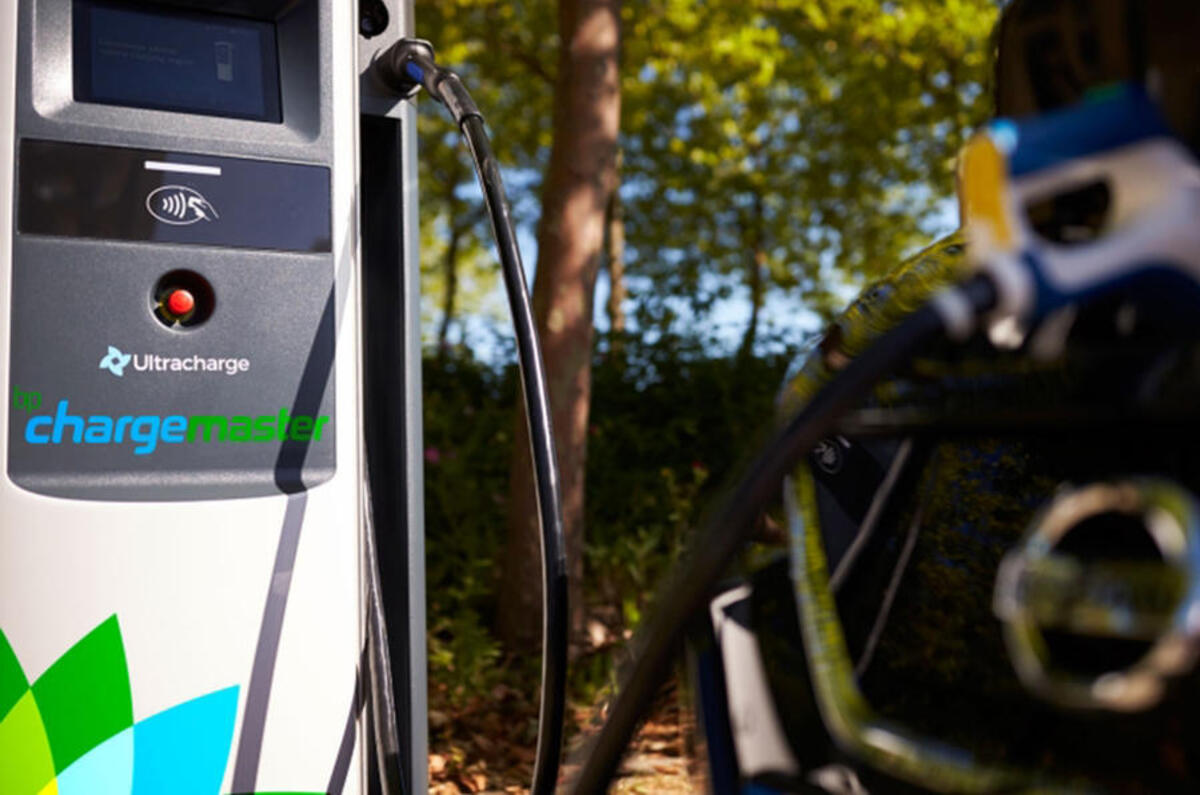All new public charging points should offer contactless payment via credit or debit card by spring next year, the government has said, as it seeks to address a key issue surrounding electric-vehicle usage.
While the requirement is not mandatory, the government announced today that it “expects industry to develop a roaming solution across the charging network, allowing electric vehicle drivers to use any public charge point through a single payment method without needing multiple smartphone apps or membership cards”.
It added that if the market is too slow to deliver improvements across the [charging point] network, it is “prepared to intervene to ensure a good deal for consumers by using powers in the Automated and Electric Vehicles Act”.
With more than 50 charging point providers in the UK, the variety of payment methods required to use a range of charging points has become a major source of frustration for EV drivers.
The announcement comes as BP Chargemaster, operator of one of the UK’s largest public charging networks, published plans to introduce contactless card payment to all new 50kW and 150kW chargers. It will also retrofit existing rapid chargers over the next 12 months.
However, the firm stated that contactless payment would be for “occasional users” to its charging points, and added that it will “continue to lead with its Polar Plus subscription” service.
A BP Chargemaster spokesman told Autocar: “The benefit of contactless payment will mostly be realised by those charging infrequently, who may not have used our network before. Today, the majority of usage on our network is from subscribers, and that market will grow with higher utilisation from fleets and businesses, particularly with the introduction of the BP Fuel & Charge card - the UK’s first combined fuel card for liquid fuels and EV charging.”
When asked about the comparative costs of contactless payment versus a subscription, he said: “The Polar Plus subscription costs £7.85 per month (with three months free for new users), with the benefits being a usage tariff that is half the price of using contactless, as well as RFID card access, which remains the quickest way to activate a charge point on our network.”
The government’s announcement did not mention pricing or its expectations regarding contactless payments costing the same as existing offerings.
Future of mobility minister, Michael Ellis, commented: “It is crucial there are easy payment methods available to improve electric vehicle drivers’ experiences and give drivers choice. This will help even more people enjoy the benefits electric vehicles bring and speed up our journey to a zero-emission future.”
Mike Hawes, Society of Motor Manufacturers and Traders (SMMT) chief executive, said: "Industry’s ambition is to deliver zero emission transport, giving consumers confidence and convenience to encourage the widespread take up of electric and other zero emission vehicles. Today’s announcements regarding simplified payment at public charge points is very welcome, and will help drive greater demand.
"There is no time to waste, however. We need the right conditions to encourage businesses to invest in electrified vehicle production in the UK and for car buyers to invest in these vehicles. We are in a global race and remaining competitive is essential. We must secure significant giga-scale battery production here combined with a long-term commitment to infrastructural and supply chain investment and consumer incentives."




Join the debate
Add your comment
Don't let politicians near it
For example, tesla doesn't need a card at all as the charger recognises the car.
My gas honda jazz was so quiet, I could be a foot behind you and you wouldn't know. But forced noise emissions for EVs only.
Emissions reducing speed limits in Wales. Evs have no emissions, so why are they affected?
The limits aren't enforced anyway.
Vat at 20% on Solar panels, but coal vat 5%. Couldn't make it up. These "leaders" are incapable of thought or are bent.
"Emissions reducing speed limits" LOL
While it's technically true reducing speed can reduce emissions, in practice it's unlikely to do so. There are a myriad of factors that could drive up emissions with a reduced speed limit.
Where do vehicles emit the greatest level of emissions per mile? Inner cities. Where are the speed limits lowest.....
Congestion is the main driver of increased NOx and particulate emissions. Lamina traffic flow would result in drastic NOx and particulate reductions, and less CO2.
But lamina traffic flow requires massive infrastructure investment.
Central Government
Isn't the problem the number of companies rather than the monthy fee they charge?
If people are willing to pay £8mth then nothing wrong with that, but that's for using just one network of chargers. It's like saying it'll cost £8mth to enter a shell petrol station, £8mth to enter a BP station, £8mth to enter a Sainsburys station etc.
If governement are serious about EV then it's just something else that can't be left to the market to decide - government need to introduce rules / standards. It's the same with all those different adapters for EV stations and certain cars only being able to charge at a particular rate. Until you can drive any car up to any charger and pay your money (just like a petrol station) then they'll have to change the date from 2040 to 4020 to get rid if ICE sales.
But
??? Still doesn't explain the economic argument for joining a charging club, £8.00 a month just for membership and occassional use?? These fees won't last, like I said no one pays £8.00 a month to join a petrol club.
Allowing credit card use and no membership fee will just speed up the process
Most of the chargers were